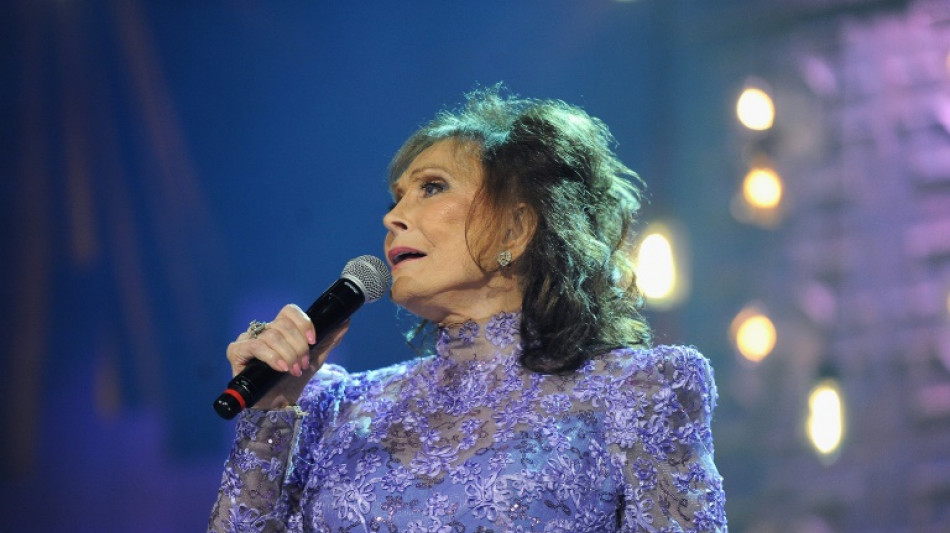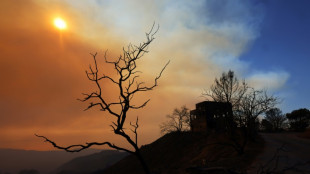

Loretta Lynn, country music luminary and songwriting pioneer, dies at 90
Loretta Lynn, America's groundbreaking country titan whose frank lyricism delving into women's experiences with sex, infidelity and pregnancy touched the nerve of a nation, has died. She was 90 years old.
A family statement published in US media Tuesday said the beloved songwriter died of natural causes.
Lynn saw a number of her edgy tracks banned by country music stations, but over the course of more than six decades in the business, she became a standard-bearer of the genre and its most decorated female artist ever.
Born Loretta Webb on April 14, 1932 in small-town Kentucky, Lynn was the eldest daughter in an impoverished family of eight kids, a childhood she immortalized in her iconic track "Coal Miner's Daughter" -- a staple on lists of all-time best songs.
"Well, I was borned a coal miner's daughter / In a cabin, on a hill in Butcher Holler," Lynn sang in the hit recorded in 1970 -- later the theme song for a 1980 movie about her life starring Sissy Spacek, who won an Oscar for the role.
"We were poor but we had love / That's the one thing that daddy made sure of. He shoveled coal to make a poor man's dollar."
At just 15 years old, the artist married Oliver Vanetta Lynn, who she remained married to for nearly 50 years until his death in 1996.
They moved to a logging community in Washington state, and Lynn gave birth to four children before the age of 20, adding twins to the family not long after.
An admirer of his wife's voice, her husband bought Lynn a guitar in the early 1950s.
It would be a fateful gift.
The self-taught musician penned lyrics inspired by her own early experiences as a married woman and her oft-tumultuous relationship, the nascent days of a prolific career that would see the artist release dozens of albums.
She started her own band, Loretta and the Trailblazers, and began playing bar sets before cutting her first record -- "I'm a Honky Tonk Girl" in 1960.
Her twang was warm and languid but Lynn's lyrics were anything but: She sang with searing precision of marriage's growing pains and gave voice to issues facing women that had long been kept quiet.
"Most songwriters tended to write about falling in love, breaking up and being alone, things like that," Lynn told The Wall Street Journal in 2016. "The female view I wrote about was new."
"I just wrote about what I knew, and what I knew usually involved something that somebody did to me."
- 'The Pill' -
The Lynns began touring nationwide to promote the singer's work to radio stations, and she made her debut at the storied Grand Ole Opry in 1960, going on to become one of the Nashville institution's most acclaimed acts.
During her early years in the industry, she found a friend and mentor in Patsy Cline, one of the 20th century's most influential singers who died in a plane crash in 1963 at age 30.
She also formed a longstanding creative partnership with Conway Twitty, with the pair becoming one of country's classic duet acts.
Lynn released hit single after hit single, including 1966's "Dear Uncle Sam" -- one of the era's first tracks to document the tragedy of the Vietnam War.
Also in 1966, she put out "You Ain't Woman Enough (To Take My Man)," which went straight to the top of the charts and made her the first woman in country to pen a number one hit.
In 1969, she released one of her most controversial songs, "Wings Upon Your Horns," which describes through religious metaphor a teenager losing her virginity.
But her runaway success continued and she dominated the 1970s with hits such as "Fist City" -- a stern warning to her cheating husband's lover -- and 1972's "Rated X," which triggered an outcry in discussing the stigmas faced by divorced women.
In 1975, she released "The Pill," which praised the freedoms of birth control.
"This incubator is overused / Because you've kept it filled / The feelin' good comes easy now / Since I've got the pill," Lynn sang.
"When I'd put out a record, they'd say, 'Uh oh, another dirty song.' 'Rated X'? They thought that was going to be bad. But hey, it sold. 'One's on the Way'? They thought that song would really be dirty," she told Billboard in 2015.
"But everything I sang about was everyday living."
- 'The truth' -
In 1988, Lynn was inducted into the Country Music Hall of Fame as one of its most storied legends.
She won virtually every arts honor available, including the prestigious Presidential Medal of Freedom, the nation's highest civilian award, given to her by Barack Obama in 2013.
Despite the progressive airs of her music, Lynn would insist that her clearly political music had "no politics" -- and leaned Republican most of her life, frequently performing for and supporting right-wing candidates -- including Donald Trump in 2016 -- even as she also voiced support for Democrats like Jimmy Carter.
But she was universally beloved in the industry she deeply influenced, collaborating with scores of artists including Dolly Parton, Willie Nelson and Elvis Costello. In 2004 she released the album "Van Lear Rose," produced by Jack White.
In 2021, a month before turning 89, she released the album "Still Woman Enough," which featured re-recordings and new material.
"As long as I'm on this earth, I will try to be on top -- somewhere," she once told Billboard, explaining that she'd never retire from music.
"When they lay me down six feet under, they can say, 'Loretta's quit singing.' I'll have on one of my gowns," she continued.
"That's morbid, but it's the truth."
S.Carlevaro--IM



